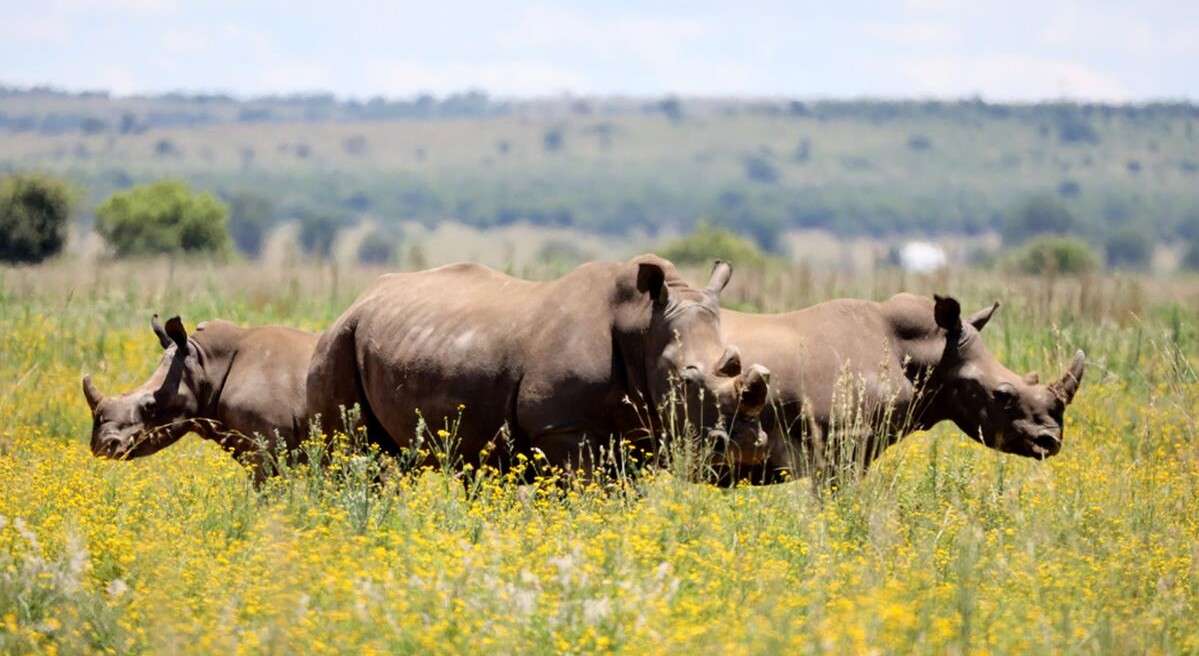Portuguese Man Accidentally Finds 82-Foot-Long Dinosaur in His Backyard
During rennovations, the owner of the property in central Portugal noticed the presence of several fragments of fossilized bones in his yard.

A giant conservation NGO has purchased the largest privately-owned rhino herd on earth to rewild them in secret locations over the next 10 years.
More than 2,000 white rhinos had been bred in captivity as part of a project called Platinum Rhino, to flood the East Asian rhino horn trade with sustainably harvested horns in order to drastically lower the price, and thus disincentivize poachers.
However the breeder, John Hume of South Africa, ran out of money after the Convention on International Trade in Endangered Species (CITES) remained adamant that they would not grant him an exception for the sale of rhino horn—banned as it has been since 1974, and so Hume put all the animals up for auction in April.
On August 4th, Africa's biggest wildlife NGO, African Parks, announced it had purchased the entire Platinum herd for the purpose of rewilding them across sites in southern Africa.
The organization managed to secure significant emergency funding that not only allowed them to buy all the rhinos, but also pay for an international, intra-Africa relocation of the animals.
These 2,000 are approximately 15% of the remaining wild population of southern white rhino. Many of them were bred in Hume's massive ranch, while he took in many others who were rescued because their mother's milk dried up or because they had been orphaned, etc.
African Parks manages 22 protected areas across 12 countries, making them the ultimate organization for this mammoth undertaking.
"African Parks has conducted multiple wildlife translocations and reintroductions–moving over 8,000 animals from 32 species to help repopulate parks and re-establish populations across Africa," reads a statement released by the organization.
"These efforts have resulted in bringing rhino back to Malawi, Rwanda, and the DRC; as well as bringing lion, cheetah, leopard, and wild dog back to Malawi, along with a historic 500 elephant initiative. Through these wildlife translocations, we have learned and gained valuable experience to consistently refine our approach so that we can ensure a greater likelihood of success for every translocation we undertake."
While African Parks, and their sponsors the IUCN Rhino Project stress the difficulty of the rewilding, Dr. Richard Emslie, a Pietermaritzburg-based rhino conservation expert, told South Africa's Daily Maverick he reckoned, having seen the Platinum rhinos, they would get on just fine.
"I would call them ‘semi-wild' rather than ‘semi-captive'. It's interesting that some of John Hume's black rhinos were sent to a property in Eswatini a few years ago—and within just a few months of their arrival one of the females had been mated by a wild rhino," said Dr. Emslie. "So I strongly suspect his white rhinos will also do fine. Obviously, this will depend on where they are going."
WATCH a short video below of John Hume explaining his life's work…
SHARE This Rewilding Project With Your Friends…
Be the first to comment